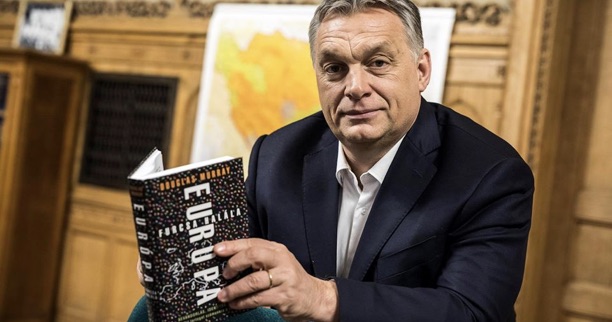
Viktor The Champion?
For Christians raised in church traditions that rarely if ever ‘did politics’, like myself, the recent emergence of politicians claiming to defend Christianity can be very confusing.
With few instruments of discernment in our toolbox, we are easily tempted to become ‘one-issue’ voters without understanding the bigger picture.
Recently I was sent a link to an article in the American Capstone Report, declaring the Hungarian Prime Minister, Viktor Orbán, to be ‘the world’s most powerful Calvinist’ fighting a noble crusade to rescue Europe and Christianity: ‘Not since the Calvinist William of Orange united a diverse coalition to save the liberties of Europe from the overreaching aggression of Louis XIV has a Calvinist politician attempted to shape the world order like Viktor Orbán’.
With a large photo of Orbán on his knees praying with the severely handicapped Australian evangelist, Nick Vujicic, the article praised the PM for his battle to ‘create a world safe for Christians’.
Another report extolling Orbán’s efforts was sent to me with the comment: ‘If only we had more wonderful Christian leaders in Europe like this man!’
Orbán posted the above photo on his Facebook page, reading the best-seller ‘The strange death of Europe’, by Douglas Murray, who argues that immigration and the loss of traditional belief is destroying the Europe we know, themes the PM himself promotes.
‘Our calling is to protect the ways of life that have their roots in Christianity,’ the Capstone article quotes the Hungarian leader. ‘We defend human dignity, we defend families, we defend the nation, and we defend our faith communities.’
Wow, that sounds great!
On the surface of it, Orbán seems to be a genuine believer deeply concerned to spread the gospel of Jesus in the face of almost overwhelming secularist opposition. In an interview last year with the French-Algerian Jewish author and activist Bernard-Henri Lévy, Orbán claimed to be ‘the most Christian, and thus the most European, of Europeans. Europe’s DNA is me. I am its guardian.’
Like American and British believers concerning their respective leaders, my Christian friends in Hungary are polarised in their views on Orbán, even within their own families. Some are comforted by talk of defending Hungary’s thousand-year-old Christian tradition against the Muslim hordes trying infiltrate their land once more.
Others however ask more discerningly: how can this Christian rhetoric be reconciled with a growing authoritarianism and illiberalism, the stifling of the free press and free speech, curtailing of the independence of the courts, the promotion of ‘demotatorship’ (democratic dictatorship), demonisation of refugees, imprisonment for human trafficking of individuals aiding asylum seekers, arrest of the homeless, and control of church registration according to political acquiescence?
Unifying force
Orbán’s Fidesz party was founded in 1988 when communism was falling apart, as a young, alternative, liberal party (Fiatal Demokraták Szövetsége– Federation of Young Democrats) with an anti-clerical political stance. Over the years, it moved further to the right, embracing a strong ‘national Christian’ political identity.
Once in power with a large majority in 2011, a new Fundamental Law was voted in (by FideszMP’s only) defining Hungary as a ‘Christian nation’, and a major task of the state as protecting the Christian culture of Hungary. The reamble reads: ‘We recognise the role of Christianity in preserving nationhood’. Christian culture, Orbán claims, is the unifying force of the nation; ‘that’s why we declare that Hungary will either be Christian or not at all.’
So, what’s wrong with that? Well, despite the Capstone Report claim, Hungarians are not very religious. Only one in eight Hungarians and one in five Fideszvoters are church attenders.
What then is this Christianity Orbán claims to be defending? Does it have biblical content? Does it preach love for one’s neighbours – and enemies? Is it concerned for forgiveness and reconciliation between peoples? Is it a message of love for all humankind? Is it concerned for God’s kingdom to spread among all peoples, for the love of Jesus to be demonstrated to the poor, the outcast and the marginalised?
Or is it not a highly nationalistic civil-religion exalting the nation as a sacred entity? Is it not a religion of cultural identity, rather than personal faith in Christ in whom there is neither Jew nor Gentile, Hungarian nor Syrian?
Orbán told the European Parliament in 2015 he wished to keep Europe for the Europeans, and Hungary for the Hungarians, goals which he believed to be in harmony with the intentions of founders of the European Union.
No, Mr Orbán, Robert Schuman would be appalled by your brazen ethno-centric nationalism, your lack of solidarity with humanity, your selective promotion of human rights only for Hungarians, your non-democratic leadership, and your pretence to defend human dignity when you deny essentials of life to sojourners.
This is not biblical Christianity. It is ‘another gospel’.
Jeff Fountain
Schuman Centre for European Studies

This Post Has 0 Comments